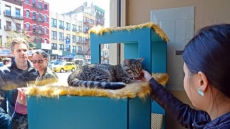Giving red wine lovers a new reason to celebrate, researchers have found that an compound in this drink could help counteract the negative impact of high fat/high sugar diets.
The findings, published in the journal Frontiers in Physiology, point to the health benefit of resveratrol, which occurs naturally in blueberries, raspberries, mulberries, grape skins and consequently in red wine.
In previous animal studies, resveratrol has already shown to increase the life span of mice and slow the onset of diabetes. In one study, it mirrored the positive effects of aerobic exercise in mice, which were fed a high fat/high sugar diet.
For the current study, J.P. Hyatt, associate professor at Georgetown University and his team of researchers fed a control group of rhesus monkeys a healthy diet and another group a high fat/high sugar diet, half of which also received a resveratrol supplement and half of which did not.
The researchers wanted to know how different parts of the body responded to the benefits of resveratrol - specifically the muscles in the back of the leg.
Three types of muscles were examined: a "slow" muscle, a "fast" muscle and a "mixed" muscle. The study showed that each muscle responded differently to the diet and to the addition of resveratrol.
The soleus muscle, a large muscle spanning from the knee to the heel, is considered a "slow" muscle used extensively in standing and walking.
Of the three lower hind leg muscles analysed for this study, the soleus was the most effected by the high fat/high sugar diet and also most effected by the resveratrol supplements. This may be partially due to the fact that, on a daily basis, it is used much more than the other two muscles.
The plantaris muscle, a 5-10 cm long muscle along the back of the calf, did not have a negative response to the high fat/high sugar diet, but it did have a positive response to the addition of resveratrol. The third muscle was not affected by the diet or addition of resveratrol.
While these results are encouraging, and there might be a temptation to continue eating a high fat/high sugar diet and simply add a glass of red wine or a cup of fruit to one's daily consumption, the researchers stressed the importance of a healthy diet cannot be overemphasised.






